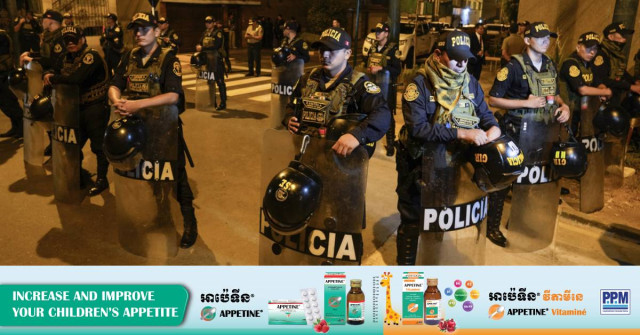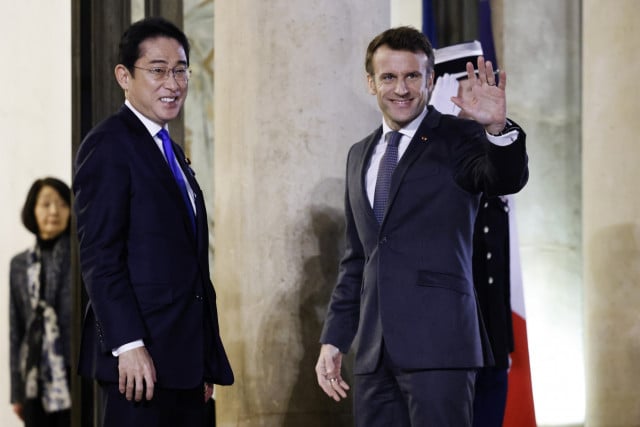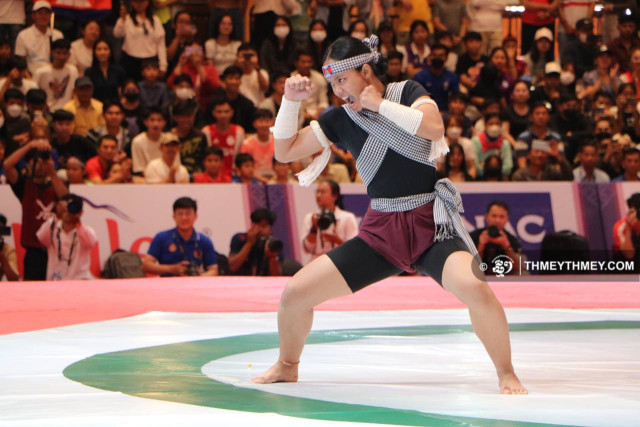A Japanese Photographer Features People on the Streets of Phnom Penh Trying to Make a Living
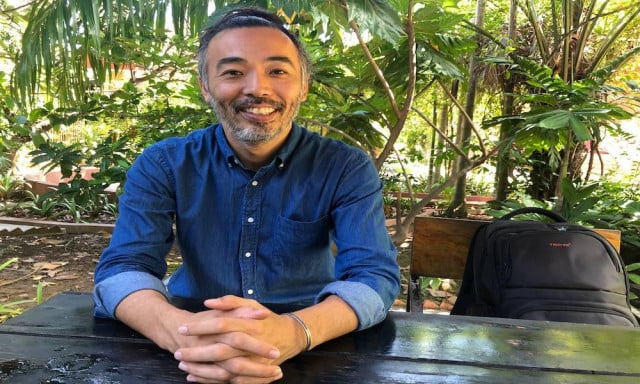
- By Phoung Vantha
- November 17, 2021 9:59 AM
In the process, he says, he has found his purpose
Shunsuke Miyatake came to Cambodia five years ago to work for a Japanese marketing and advertising agency in Phnom Penh. A co-founder of ART4FOOD—an initiative of artists and photographers to collect and distribute food to cyclo drivers and families living on the streets of Phnom Penh—he uses his free time to document the lives of ordinary people doing their best to survive.
Phoung Vantha: Are you a photographer by profession or did you study in another field and become interested in photography later on?
Shunsuke Miyatake: I studied international politics and economy in Japan. I’m working for a Japanese communication agency and am a director of the Cambodia office. So, I’m not a photographer by profession. However, I started iPhone photography as a hobby in 2010, and became passionate about photography…Since moving to Cambodia in 2016, I have been focusing on documenting people’s everyday life/photography for good when I have time. I’m a co-founder of ART4FOOD and was one of the winners in the Single Images category at the 7th Annual Featureshoot Emerging Photography Awards in 2021.
Phoung Vantha: What is your approach to photography?
Shunsuke Miyatake: I’m trying to capture the beautiful moment in our everyday life. The beautiful moment for me is not beautiful places, nor beautiful models, but the humanity on the street. Sadness / Joy / Hope / Youth / Anger… those human emotions on the street. In Cambodia, especially on the streets, I can feel the real human interaction, which we lost in this digital era.
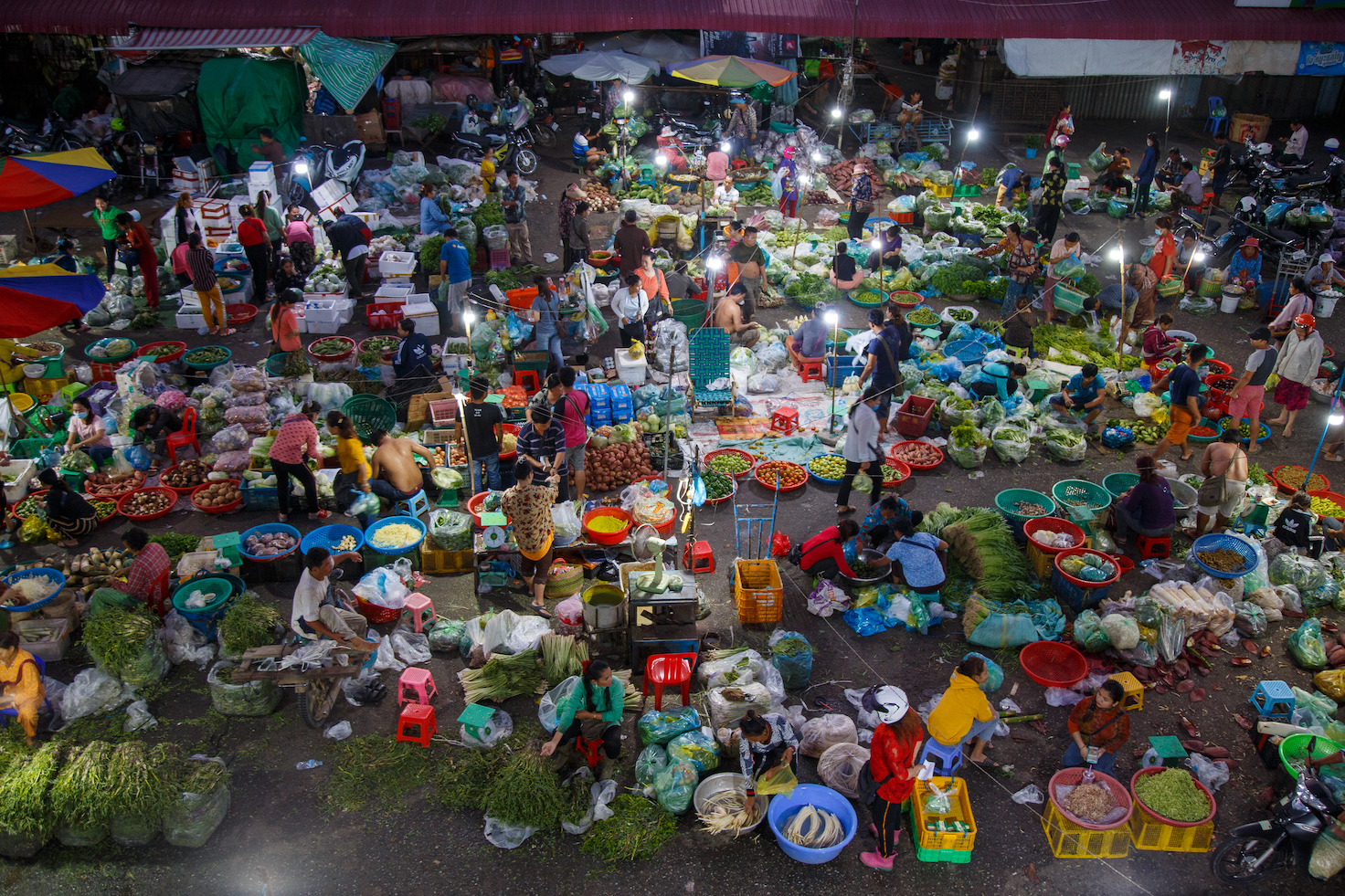
Phoung Vantha: Do you especially like to photograph people? And if so, why?
Shunsuke Miyatake: Yes, the people are my subject. People are in my every single photo. Our daily life is getting way more convenient with the development of infrastructure and technology. But at the same time, we are losing the real human interaction in many places. In Phnom Penh, I can still feel it here and there. The conversation between customers and shop owners, the hustle and bustle in the street markets, crying children and parents calming them down. It is still very common here, but it may vanish sometime soon with the economic growth. Did you notice that the street vendors along the riverside have disappeared? I want to document this humanity of people’s everyday life so it can be saved and not forgotten.
Phoung Vantha: How do people tend to react when you ask to photograph them?
Shunsuke Miyatake: Some are shy, some are not. But most of the time, they are quite happy after I take their photo and show it to them.
Phoung Vantha: Do you take a photo right away as you meet them? Or do you talk to them first and then take photos as they go about their work?
Shunsuke Miyatake: It depends on the occasion. When they seem to have time, I talk to them and after chitchat, I take their photo. But when they are busy, of course, I can't disturb them. I just take photos of them and, if they allow it, I show them their photo afterwards. When I find some beautiful moments on the street by chance, of course I can't talk to them. I just take photos from afar.
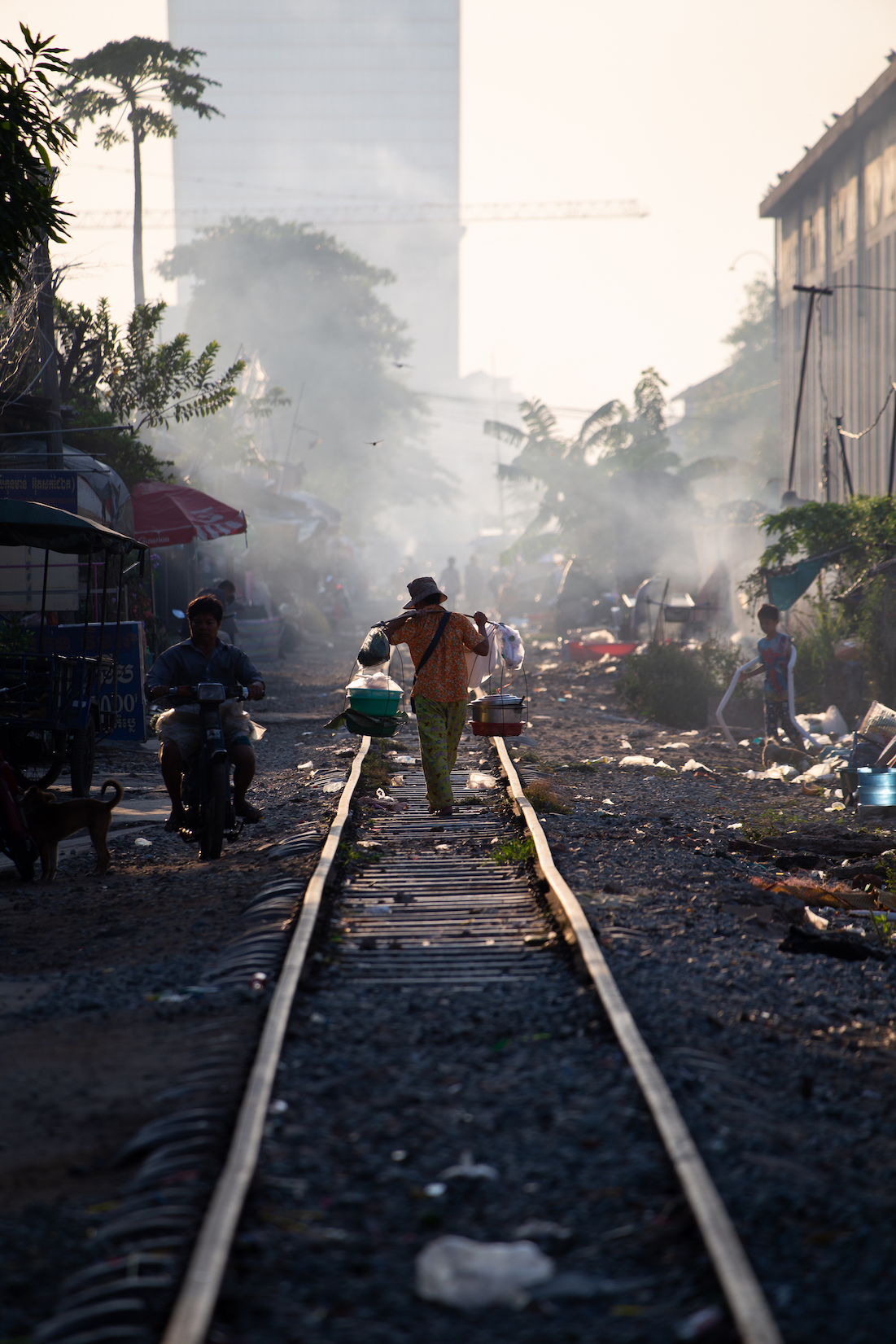
Phoung Vantha: Has there been a person or moment that felt particularly special when you took the photo?
Shunsuke Miyatake: When I took photos of this guy, it was a moment of discovery.
I went to interview him with my great friend Taing Huang Hao [founder of Local4Local, a food bank for cyclo drivers and street people in Phnom Penh].
When I took this moment, I had been thinking for a long time.
As I wrote in Instagram, I had woken up before 5:00 am and gone along the railway, with two of my friends to see and feel Raw Life. There were robbers on motorcycle along the way, there were kind of drug dealers at some point, there were families with little or no clothes, there was nasty garbage, there was a strong contrast between urban development and local struggling people, there was a lot of smoke coming from the burning garbage. At the same time, there were a lot of smiles on the people's faces, there were interaction between people and pigeons, there were kids playing around, there were people sitting down together and discussing something, there were women washing dishes with rainwater in a bucket, there were families waiting for breakfast in a tiny hut, there were a lot of laundries hung in the air. There was no right or wrong: There was just life on the railway.
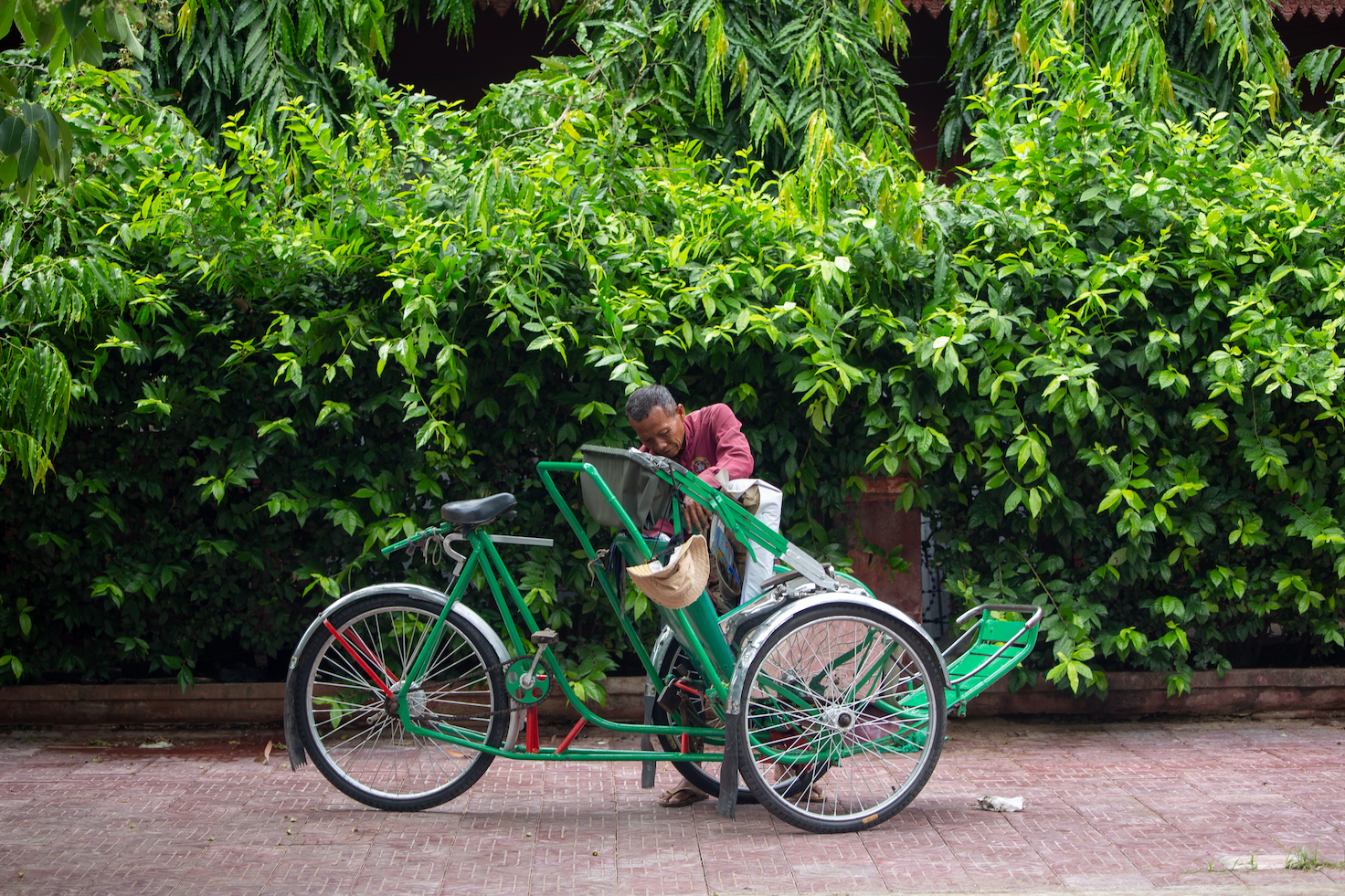
Phoung Vantha: Has there been a person or moment especially difficult to deal with or photograph? And why?
Shunsuke Miyatake: Because she didn’t want to talk about herself and she was feeling ashamed when I interviewed her. She is a garbage picker working from morning till night. And she gets $2-$3. She was feeling so ashamed working like that. But before and after the conversation, she said to me “[t]hank you for having a conversation with me.” I cried after hearing this from her.
Phoung Vantha: If I ask you what has been a most special meeting or moment when you were photographing, what would it be? And why?
Shunsuke Miyatake: This is my favorite photos and I put these five photos at ART4FOOD.
These photos are really beautiful moments in our daily lives. When I took these, I sighed every time. Because most of the people were walking around them every day and knew the places were there, but were just passing by. I couldn't pass by. I was thinking I would be able to capture the beautiful moments if I go up from here or take from here. And then I could.
The very reason why I feel good about these photos is that Nobody discovered but I could discover, and I can change the perception of others with everyday-life moments.
Phoung Vantha: You have photographed many people who barely manage to feed themselves and their families. Why do you feel it important to make them known?
Shunsuke Miyatake: I have been working here and going around Cambodia since 2016. I have taken bunch of pictures of various people on the street. They taught me a lot of different perspectives, pure curiosity, happiness in tough life. I got a lot from them. So, I am feeling I have to give back to them. That's the reason.
As I mentioned, most people can't notice the beauty in our daily lives. They see beauty in the beautiful places. Same as this, most people can't notice the people in need. They see rich, wealthy, powerful people. Many people asked me why I photograph dirty places or people. I am taking humanity, I reply every time. At the beginning, they didn't get my point, but now I feel more people understand what I am photographing. That is important.
I always want to be both a Japanese citizen and a global citizen. That is why I started ART4FOOD as a co-founder with friends from all over the world to help the people who are suffering in Cambodia, especially in the COVID-19 situation. If we didn't have the awareness of being global citizens, that project might not have existed. I believe that nationality has nothing to do with the act of helping people who are suffering. I am not a UN official or a journalist, but if there are people suffering, I cannot just turn a blind eye. When events occur that cannot be overlooked, I think about what I can do for them, and if there is anything I can do to make even a small impact, I will gladly reach out to them.
We may be from different countries, but we are brothers and sisters living on the same planet, aren't we? If someone is suffering, we help them; if we are suffering, we ask for help. Isn't it our duty as Global Citizens not to think that all is well with ourselves? That is what I want to tell through my photos.
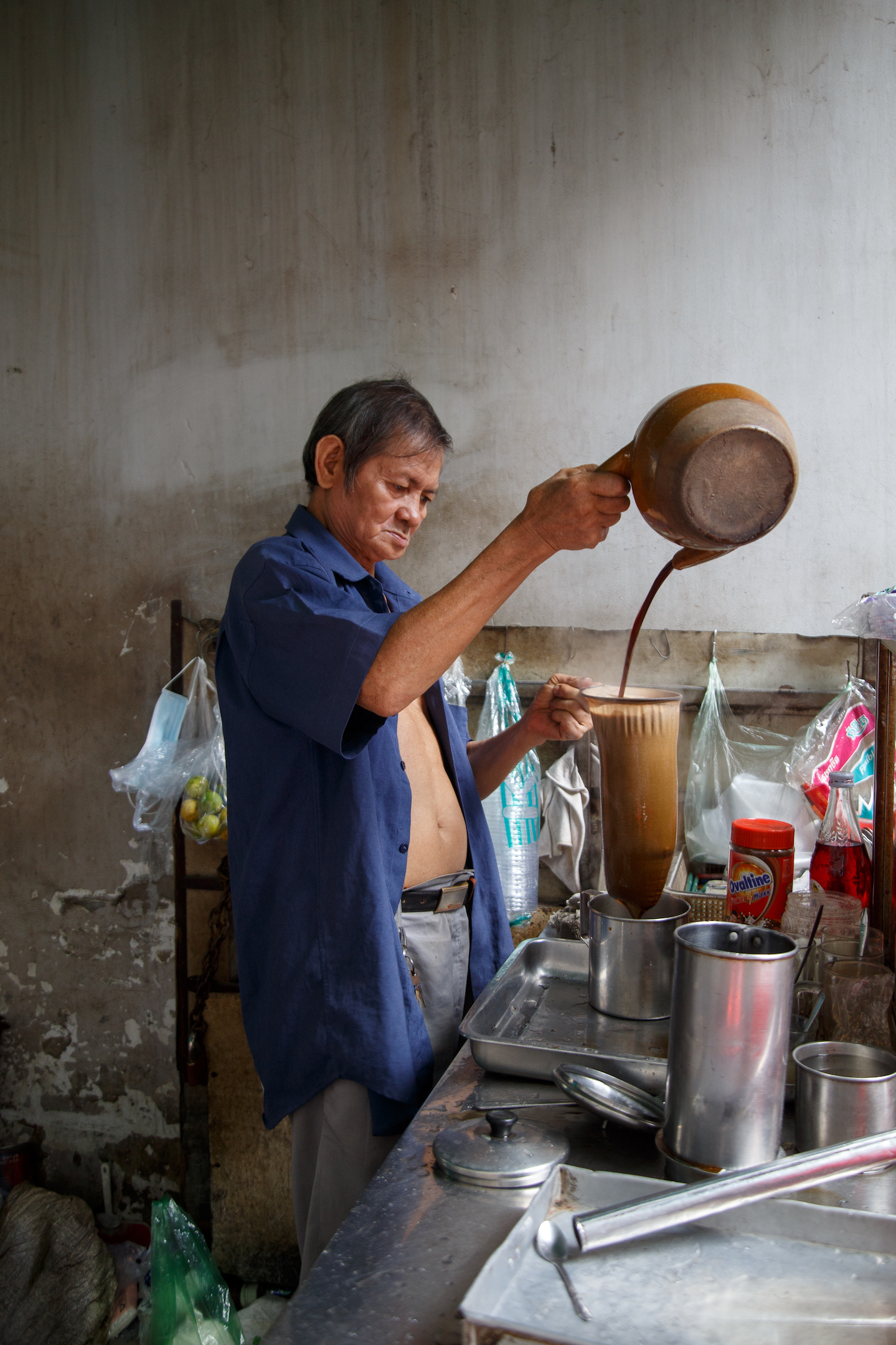
Phoung Vantha: What impresses you the most about people?
Shunsuke Miyatake: People living in Cambodia literally enjoy the convenience and material wealth which, compared with before, is so great that it actually changes people's lives. But at the same time, I think they are losing something that is more important to our lives than this.
There are a lot of big, fat cars on the street. “Bigger is better” mindset here and there. There's a lot of skyscraper buildings on every corner. “New is cool” everywhere. There's a lot of people who don't care about vulnerable people. "People in power can do anything" in many people's mind. I call this mindset “the price of convenience.”
For me personally, cyclos are beautiful, wooden houses are awesome, and no one should be left behind. And the coffee shop owner, the garbage picker, the young monk, students in the provinces, the old man checking tires, the young girl working in a flower shop: All the people I met on the streets of Cambodia know that every little thing matters.
I don't deny the efforts to be rich or materially wealthy, but I wished that people with good heart would tell those people losing their minds that we should pursue spiritual wealth rather than material wealth. And I do hope those voices from the everyday people will reach the people who shape this country.
Phoung Vantha: Anything you would like to share or tell people about photography, photographers, the people you photograph, or anything else?
Shunsuke Miyatake: It's been five years since I came to Cambodia on business from Japan. I have been to many places in Cambodia and have taken a lot of pictures.
I've seen people whose lives are completely different from mine, like people forced to live on the street, people forced to leave their houses in which they had lived for many years, and children playing in garbage dumps. At the same time, I’ve interacted with people living more comfortably in condos with pools and those partying at the bars or clubs every week.
Homeless people on the streets, students studying in rural areas, CEOs of startups with dreams of making an impact on society. Artists who are passionate about inspiring others, football players trying their best to win the league. The street coffee-shop owner who is always surrounded by regulars. Businessmen from all over the world.
As I met people from all walks of life, one big question was coming to mind:
“WHAT REALLY ENRICHES OUR LIVES?”
It is true that the Internet has made the world more accessible and the development of technology has enriched human life. On the other hand, no matter how much new technology is developed, it is a fact that some people have no choice in life unlike others, depending on their environment and where they were born.
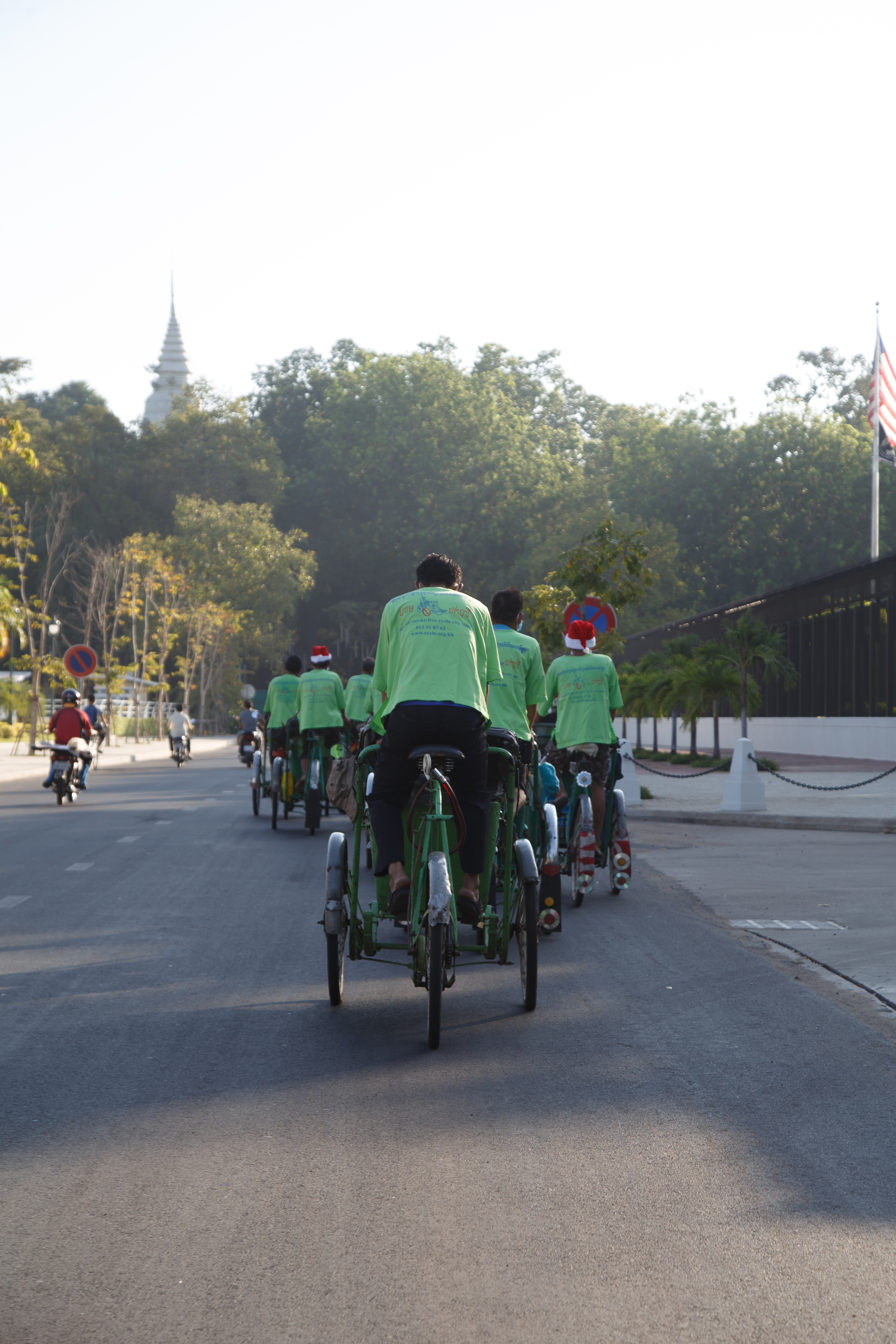
That's why I decided to start this experimental project HUMANISTA .
This is my project using a single question and a portrait. The subjects are people I have met somewhere in Cambodia, regardless of country, gender, age, religion, profession, or background. The purpose of this project is to collect the stories of everyday people that cannot be found on the Internet and to showcase those stories and inspire other lives in the world.
WHAT IS YOUR PURPOSE IN LIFE? WHAT REALLY ENRICHES YOUR LIFE?
No matter how many Google searches you do or how many Facebook connections you make, you won't find the answer to this question. Because the answer only exists within you.
In an era where the coronavirus has claimed the lives of more than a million people around the world; where there is a division of thought, speech, and economy in various countries and regions; where there are calls for a review of excessive capitalism; where the future of the world is extremely uncertain; and where everyone is living with anxiety, I would like to expand this personal project along with these unanswered questions.
This project is ongoing. This would be my life work. I'll keep on this project a lifetime long for sure. I will take portraits, ask the same question "WHAT IS YOUR PURPOSE IN LIFE? WHAT REALLY ENRICHES YOUR LIFE?" wherever I go in the world and showcase the stories on my website.
At some point, I might publish books, and have some exhibitions in different cities with selections of diverse stories. But the ultimate goal of this project is inspiring people with other people's life stories.
I would be super happy if people would think about WHAT REALLY ENRICHES OUR LIVES, their own “IKIGAI,” purpose of life, along with the fact that there is a diversity of people's lives in the world, through this project from Cambodia.
Shunsuke Miyatake, who has been contributing to ART4FOOD through his photos, is holding a street photography workshop on Nov. 28, the starting point being the Ikigai Arts Center located at 52A Street 240 in Phnom Penh. For more information, check here






